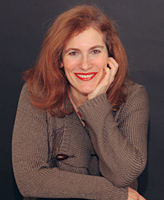| |
 |
| |
Mara
Einstein '88 |
| |
|
Alumni
Profile: Mara Einstein '88
Sacred
wows
Mara
Einstein '88 explores marketing side of religion, religious
side of marketing
By
Aubrey Henretty
"Religion
is being marketed now in ways it never has been before,"
says Mara Einstein '88, an associate professor of media
studies at Queens College at the City University of New York.
Take
New York City's local Kabbalah Centre. Einstein says this
gathering place for students of Jewish mysticism gladly uses
pop star Madonna — a self-proclaimed Kabbalist —
to market itself, a strategy that would until recently have
been unthinkable to any organized religious group.
Madonna's
image may have changed in the past two decades, but Kabbalah's
religious tenets have not. "If you really want to study
Kabbalah, you have to be orthodox," says Einstein. And
who better than a celebrity to hold sway with potential (mostly
female 20- and 30-something) converts to persuade them to
follow a kosher diet, wear long skirts, and stay home on the
weekends? Could the actual leader of the Centre, a grandfatherly
rabbi in his 70s, ever hope to wow these newcomers as effectively
as the Queen of Pop does?
Einstein,
who has a doctorate in media ecology from New York University,
thinks not. She also thinks religious leaders and marketers
have more in common with each other than either group may
be comfortable admitting. She explores the overlap in her
second book, Brands of Faith: Marketing Religion
in a Commercial Age, which will be published by Routledge this fall.
In
the United States, says Einstein, "religions have always
had to market themselves and compete with one another."
And changing expectations are adding fuel to the fire. "It
used to be if your mother went to a Baptist church, you went
to a Baptist church," says the Kellogg graduate, who
worked on the marketing side of the entertainment and broadcast
industries for several years before pursuing her doctorate.
In
the 21st century, she says, anyone with a computer and an
Internet connection can learn to meditate, summon restless
souls or give up religion altogether: "Religions are
competing not only against each other, but against all other
leisure-time activities."
"The
secular has become more sacred and the sacred has become more
secular," says Einstein. To illustrate the point, she
refers to Texas megachurch pastor Joel Osteen and media mogul
Oprah Winfrey. Osteen is a pastor, but his sermons are televised
and attended by thousands, and there's always a ticker at
the bottom of the screen or a graphic in the corner promoting
Osteen's Web site or his book. Winfrey, a decidedly secular
figure, inspires a sort of religious zeal in her fans. Her
Web site invites visitors to improve themselves with a banner
that reads, "Live your best life," and Winfrey herself
describes her studio guests' appearances as "testimonials."
Einstein
does not mean to suggest that religion is nothing more than
a consumer product (though she emphasizes that it is indeed
a product) or that consumer products may one day replace religion,
but she does think marketers and religious figures can benefit
from each other's strategies. She returns to Osteen:
"Think
about him as a brand," she says. "He's the pastor
of Lakewood Church. The church isn't the brand — Joel
Osteen is the brand." Members of Osteen's flock all know
the story of his reluctant rise to prominence from his former
post in the production and marketing side of Lakewood and
how he wore his father's shoes symbolically during his early
days as his father's successor as pastor. Einstein says this
elevation of Osteen from man to myth has been integral to
Lakewood's success.
"Ultimately,
it's about personal selling. It's about becoming an evangelist,
whether you're talking about a Mac computer or you're talking
about Jesus," she says. "It's the creating of a
myth. It's the re-telling of a story."
|



